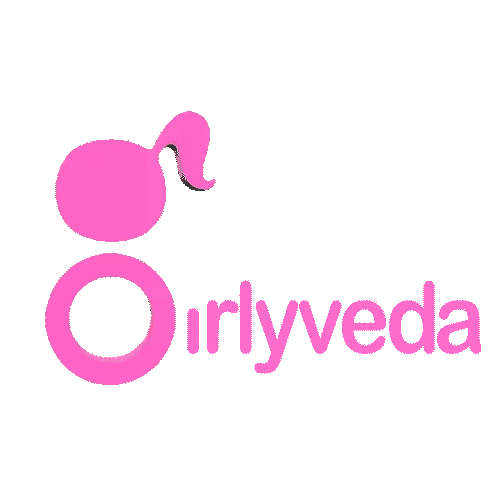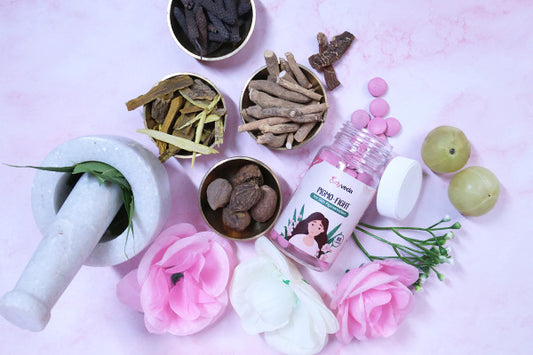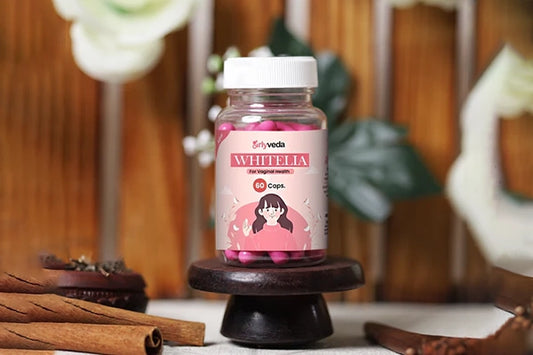How Ayurveda Helps in Balancing Hormones in PCOS and PCOD? Effective Tips

We all are aware about the term “PCOD” Every second girl suffers from it because of the irregular unhealthy lifestyle. This is referred to as Polycystic Ovary Syndrome(PCOS), it is a health condition where partially matured eggs or immature eggs form cysts in the ovaries.
This condition can result in enlarged ovaries and an overproduction of male hormones, leading to issues like irregular mensuration or infertility, weight gain, and various other health complications.
In India, it is estimated that around 9% to 36% of women are affected by PCOD. Thus, in order to treat it, medical practices, synthetic medications are used, that have their own side effects, thus PCOS Relief Capsules for Women are used with the inclusion of diet and yoga, and one can manage it effectively.
Ayurvedic Treatment for PCOS
Ayurvedic texts is an evidence about the significance of herb, the origin of PCOD comes up from child hood habits, such as the use of diapers and tight-fitting clothes, as well as adult habits like suppressing urges to pee. These factors disturb the flow of Vata energy. Such blockages signify an imbalance in kapha energy that disturbs the hormonal balance. Because the uterus is linked with vata, so it also impacts vata energy. This also leads to elevated testosterone hormones level , thus increase in the male hormone. In ayurveda, the fire element represents feminine energy, while the water element signifies masculine energy. Thus, the objective is to improve the fire element within the individual, which can be accomplished by harmonizing hormones like estrogen. Thus, it requires the management of the following:
- Ayurvedic detoxification
- Correcting Hormones
- Lower Insulin resistance
- Regulate menstrual cycle
Now, in order to work upon the condition, you must find the product that has all the key ingredients. For more ease, we have listed down the name of all those ayurvedic herbs for PCOS:
-
Siras Beej: One of the renowned powerful herbs for its remarkable ability to promote hormonal balance and enhance reproductive health, especially in addressing issues such as PCOS. This herb has the capacity to regulate menstrual cycles, diminish ovarian cysts, and boost fertility by tackling root causes of hormonal imbalances.
-
Kachnar: It is a powerful formulation that offers a ton of health incentives and is used in the treatmenet of several diseases, It helps in detoxification by eliminating toxins, it corrects menstrual disorder such as ovulation, promotes weight loss, and hormonal imbalance.
Punarnava : It is rich in therapeutic benefits, that promotes the production of reproductive hormones in women, helps in blood circulation, through insulin insensitivity, and effectively manage PCOS. - Shatavri: It is one of the powerful herb for the reproductive health of women. It helps to prevent development of new cysts and reduces recurrence of disease. Additionally, It regulates menstrual cycle, typically lasting between 3 to 7 days, and ensures a healthy flow.
Effective Ayurvedic Diet for PCOS
1. Foods To Include
- Healthy Fats: For hormone production, it is necessary to include right kind of fats in our diet. Foods like avocados, nuts are excellent sources of mono-saturated and polyunsaturated fats. These food in diet helps in reduction of inflammation and promote hormonal balance.
- Antioxidant rich: Fruits like berries and cherries helps in safeguard your cells and enhance your natural detoxification as they fight with inflammation and oxidative stress associated with PCOD.
- Lean Proteins: Incorporating proteins into your diet is essential for effective management of PCOS. Opt for lean protein options such as fish, skinless chicken, and lentils. These choices not only aid in maintaining muscle health but also help you feel satisfied, curbing the urge for unhealthy snacks.
2. Foods To Avoid
- Processed Food: Sugary treats, fast food, and sweetened cereals, are often packed with unhealthy fats, these ingredients can cause rapid increase in blood sugar levels, spikes insulin resistance, all of which poses serious challenges in managing PCOD.
- Sugary Items: In order to effectively manage your PCOS, you must avoid intake of sugary soft drinks, fruit juices, and energy drinks. These beverages are typically loaded with added sugars that can spike blood sugar levels rapidly. Instead, one must choose water or herbal tea, or unsweetened drinks to keep ourself hydrated.
- Excessive Caffeine: Intake of excessive caffeine can lead to imbalance in the hormones, although moderate caffeine intake is safe but moderate caffeine can be harmful.
- Red Meat: Lean protein is healthy like fish, poultry but processed meat is unhealthy like sausages and hot dogs can increase the risk of PCOD
Ayurvedic PCOS Relief Capsules
There are various solutions available for managing PCOS, but incorporating herbs and a balanced diet can be particularly effective. Adding these capsules with regular exercise and meditation can alleviate stress? In our fast-paced world, if adding herbs to your daily routine seems challenging, thus consider opting for PCOS Relief Capsules that contain a blend of beneficial ingredients designed to support menstrual health.
FAQ:
-
How can Ayurveda help balance hormones in PCOS?
Ayurveda balances hormones in PCOS through personalized treatments that address root causes and promote overall wellness, including herbs, diet, and lifestyle changes. -
How effective is Ayurvedic medicine for PCOD?
Ayurvedic medicine can be effective for managing PCOD symptoms, though results vary and it is often most beneficial when combined with conventional treatments. -
What Ayurvedic herbs are effective for managing PCOS?
Ayurvedic herbs like Shatavari, Ashwagandha, Saw Palmetto, and Turmeric are commonly used to balance hormones and support reproductive health in PCOS. -
How does Ayurveda treat hormonal imbalance in PCOD?
Ayurveda treats hormonal imbalance in PCOD by using herbs, detoxification, and dietary changes to restore balance between the body's doshas and regulate the menstrual cycle. -
Can Ayurveda cure PCOD?
Ayurveda cannot cure PCOD but can significantly manage symptoms and improve hormonal balance with a holistic, individualized approach.












Thoughts on "How Ayurveda Helps in Balancing Hormones in PCOS and PCOD? Effective Tips"